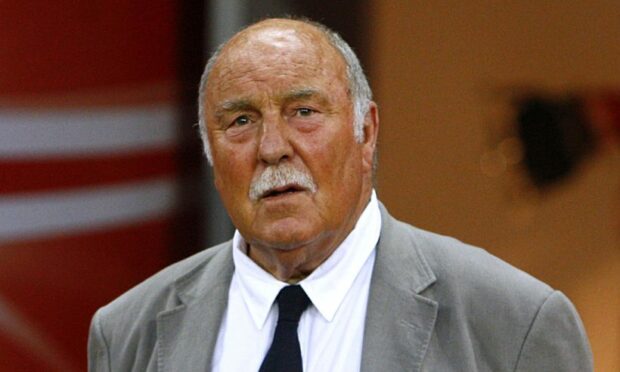It was one of the rites of passage of the 1980s: watching the banter, bonhomie and boisterous patter between Ian St John and Jimmy Greaves, who brought personality to the previously prosaic world of TV football.
Yet, before they joined forces in 1985, this dynamic duo were superb footballers in their own right who experienced triumph and tragedy in their lives. St John, the Motherwell-born hitman made a total of 425 appearances for Liverpool, scoring 118 goals, including the one in 1965 that brought the FA Cup to Anfield for the first time in the club’s 73-year history. Nicknamed Saint, he was often a sinner in the disciplinary stakes.
Greaves, an English bulldog with a similarly Bunteresque appetite for goals, amassed 44 in 57 appearances for England, including six hat-tricks and became Tottenham’s all-time top scorer with 266 in 379 games. Earlier, he had claimed 132 goals in 169 matches for Chelsea after kicking off his career in 1957 and possessed the ability to create chances in the blink of an eye, frequently leaving defenders clutching at shadows.
They thrived in a period when the leading players were still treated like chattels by their employers, and where there was no easy road to the TV studio for former professionals.
St John, who died earlier this year, lost his steelworker father, Alex, at the age of just 36 and his mother, Helen, was left to raise him and his five siblings on a widow’s pension which was supplemented by cleaning work, while he delivered milk and bread on a horsedrawn cart for the Co-op and strove to supplement the family income.
Greaves, who passed away at the weekend, was traumatised by the death of his four-month-old son, Jimmy Jnr, in 1961, and, despite his many successes, struggled to cope with the disappointment of missing out on a World Cup winner’s medal.
Retirement brought further travails when he found refuge in the bottle and faced a lengthy battle with alcoholism. As he admitted in 2003: “I lost the 1970s completely. I was drunk from 1972 to 1977. I woke up one morning and realised that it was a different world. I had been living in it, but I hadn’t been aware of it.”
The pair complemented each other
Yet, because these earthy characters had grown up in working-class backgrounds and maintained contact with their grassroots friends, there was never any sense of prima-donnaism in their make-up. On the contrary, they complemented each other perfectly and their irreverent attitude to analysing matches and speaking their minds was a breath of fresh air at a time when too many pundits were detached from the game.
It helped, too, that they genuinely loved the sport they graced and could appreciate the achievements of such clubs as Ipswich Town and Aberdeen.
Listen, for instance, to the joy in St John’s voice when he was commentating on the Dons’ European Cup-Winners Cup triumph in Gothenburg in 1983, even before he joined forces with Greaves. There was a massive whoop and a cry of joy when John Hewitt grabbed the late goal which finished off Real Madrid and it was almost as if St John was about to leap out of the TV studio and run onto the pitch.
Greaves, for his part, could be scathing about Scottish goalkeepers, but spoke with admiration and respect for what Alex Ferguson achieved in the Granite City and was one of the first people to predict the Govan gaffer would be successful in England.
He told his colleague: “What Alex did at Pittodrie was remarkable and I wasn’t surprised that they won in Europe. Real Madrid looked a bedraggled outfit and when a man like [Alfredo Di] Stefano puts on a defender in the closing stages and they were obviously playing for penalties, I really think it showed Aberdeen’s superiority.
“There was their fitness, their control, the fact that everybody played well, and [Willie] Miller and [Alex] McLeish were both masterful, apart from the one mistake [by the latter for Real’s goal]. And Gordon Strachan got stronger and stronger as the match went on. They were all great, Ian. And they can all be very proud of themselves.”
Football’s Morecambe and Wise
It’s one thing to be enthusiastic, another entirely to be able to communicate that to an audience who had never witnessed anything like Saint and Greavsie before, but the pair managed it through mutual respect and a refusal to take themselves too seriously.
The redoubtable St John was the straight man, who provided myriad opportunities for the garrulous Greaves to pick up the ball and run with it and the chemistry between them was the main reason why the show worked and why millions of viewers tuned in to enjoy their repartee every Saturday afternoon.
They even branched out into other pursuits occasionally – Greaves was astonished and thrilled when the cricketers of Freuchie surged to unprecedented glory in the National Village Cup at Lord’s in 1985. And they were natural born comedians as well.
So it’s sad that both of them have gone and within the space of six months. They might have hailed from a different age before the best players could command extravagant salaries and pick and choose where they plied their trade.
But Jimmy and Ian have left a positive legacy behind them and abundant stardust memories if you fancy checking them out. They were football’s Morecambe and Wise.
